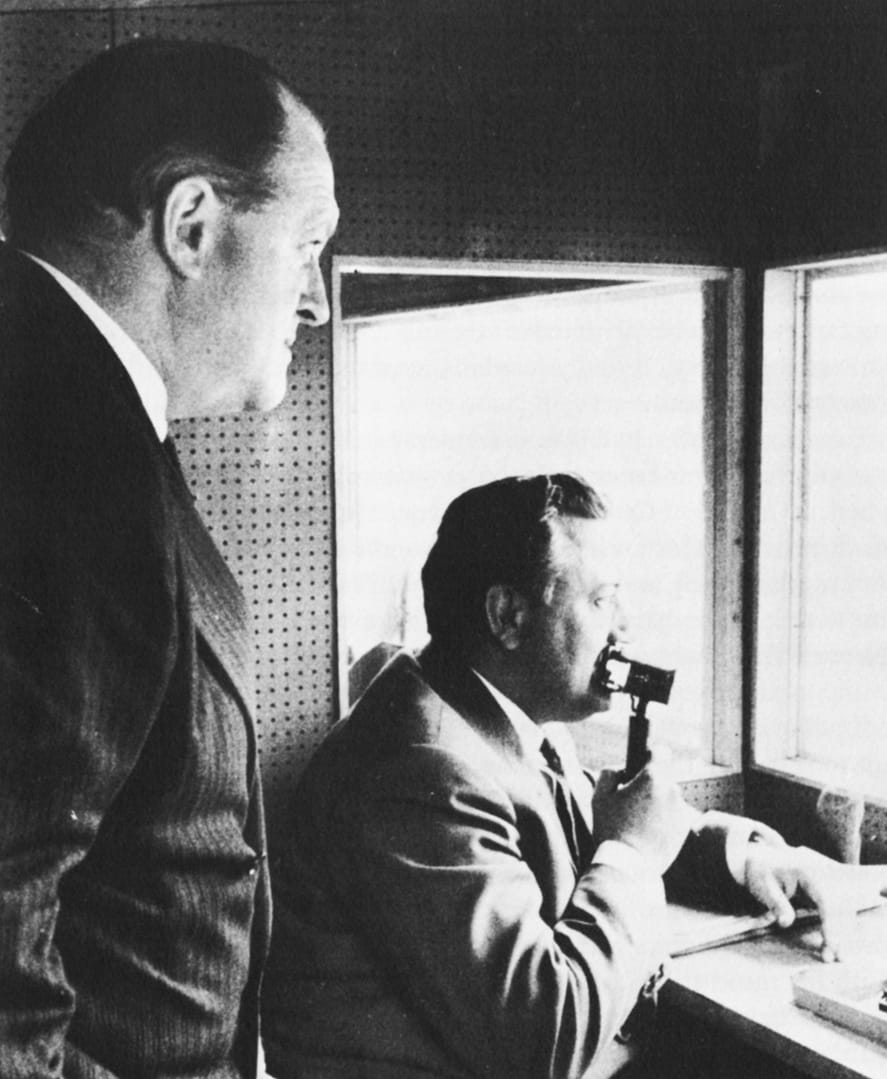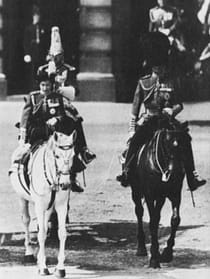As a reciprocal gesture the Russians agreed to relay the Trooping the Colour, and Yuri Fokin came to London to speak the Russian commentary, following on headphones what Richard Dimbleby was saying. Dimbleby always briefed the European commentators carefully before any major event, and greatly eased their tasks for them. A month later Major Gagarin unexpectedly came to Britain to appear at the Soviet Exhibition at Earl’s Court.
On Tuesday 11 July 1961, Dimbleby was at London Airport to describe his arrival. Gagarin was met by the Soviet Ambassador, the Deputy Chief of the Air Staff, and a civil servant, the secretary to the Minister of Science, Lord Hailsham. Dimbleby was also the commentator later that day at a televised press conference from the Earl’s Court Exhibition, a curious affair at which much of the questioning was puerile, and some speakers from Eastern Europe insisted on reading out poems to the cosmonaut. Belitzky was again doing the translating, and Dimbleby complained on the air that he thought the arrangements at London Airport for greeting the first man to travel in space had been inadequate. A member of the Government and not a civil servant should have been there.

There was in fact a lively debate in Britain on the degree of welcome which should be extended to Gagarin, for this was a period of some political tension in Anglo-Soviet affairs. It was soon resolved by the Queen inviting Gagarin to one of her informal luncheon parties on the Friday of that week.
Meanwhile some newspapers charged that the BBC was departing from its charter by taking sides in a current controversy, and I told our press office to point out that Richard was expressing his own view, which he was perfectly entitled to do. The BBC as such was not, as alleged, taking an editorial line. The ‘Daily Herald’ and some others made out that the BBC was annoyed with Dimbleby and was publicly repudiating him. This in turn made the new Director-General, Hugh Carleton Greene, angry, and he took the trouble to telephone Dimbleby to assure him personally that the papers had got it all wrong. Dimbleby, who had at that time not met the new Director-General, much appreciated the telephone call.
Meanwhile we were trying to arrange a proper television interview at which Gagarin could be questioned. Paul Fox was handling the negotiations with Rogov of the Soviet Embassy. After several conversations on Thursday 13 July, the Russians agreed, provided that Yuri Fokin could be part of the panel, and that the general areas of questioning, though not specific questions, should be submitted in writing as soon as possible. This was accepted and we prepared announcements to say that a special programme ‘Meet Major Gagarin’ would be recorded at the Soviet Exhibition the next day and transmitted later that evening in place of a Burns and Allen programme. Richard Dimbleby would be the chairman, Tom Margerison, Science Editor of the ‘Sunday Times’ would be on the panel with Yuri Fokin, and Boris Belitzky would be the interpreter.
Meanwhile the British Government had changed its official attitude towards Gagarin. On that Thursday I went to a hastily arranged reception for him at the Hyde Park Hotel. The Prime Minister, Mr Macmillan, the Foreign Secretary, Lord Home, and the Minister of Science, Lord Hailsham, were all there.
Later that evening Lord Hailsham came to Lime Grove to appear on Gallery. While we were talking with him and Lady Hailsham after the programme Paul Fox phoned. He said that, despite the earlier agreement, Rogov had just been instructed to insist that unless every single question to be put to Gagarin was submitted in writing by 9.30 the next morning the programme was off. I told Fox that in that case the programme would have to be off. Distinguished broadcasters like Margerison and Dimbleby could never agree to submit all their questions in advance. Nor could the BBC. But I also told him to warn the Soviet Embassy that we would have to announce why the broadcast was cancelled. I also asked Fox to go round to the Soviet Embassy the next morning to try to get them to return to the earlier agreement.
Fox telephoned the next morning to say all was well. The Embassy had withdrawn its demand for written questions in advance. Gagarin with Belitzky as interpreter went to lunch at Buckingham Palace, and came straight on to the room in the Earl’s Court Exhibition where we had set up our cameras.
Gagarin entered accompanied by the Soviet Ambassador, who was in a bad temper, and General Kaminin, the Russian in charge of space experiments. There was also a large collection of very tough-looking security men. Dimbleby greeted them all courteously.
The discussion went very well. Gagarin had great charm and answered easily. At the end, just as Dimbleby had been given a ‘Three minutes more’ sign by the floor manager, Fokin stepped in with a very long and heavily polemical statement only just in the form of a question. Gagarin gave an equally long political reply. Dimbleby wasn’t going to end on that note, so he quickly asked Gagarin what presents he was proposing to take back to Moscow. There was a hurried consultation with Belitzky, who replied, ‘Major Gagarin is going to take back toys for his children, souvenirs of London, and something for his wife which he will not disclose, in order that it may remain a secret.’ It was in fact a fur coat. After the interview the Ambassador, General Kaminin and the strong arm men had a long huddle with Gagarin before he was filmed for an ITN interview. Rogov said to Fox, ‘Ah well, we all have to compromise!’ Fox replied sharply, ‘What do you mean! We didn’t.’

